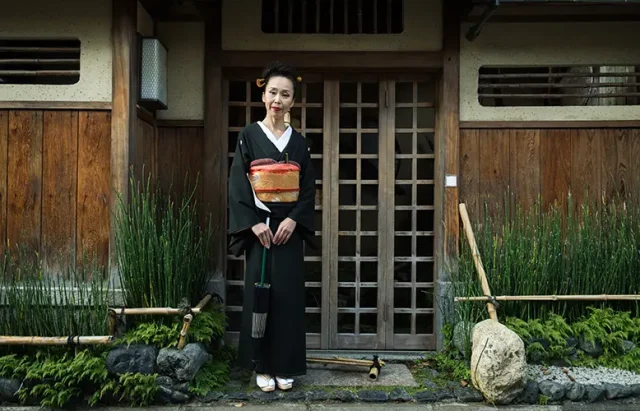
Ryokans are traditional Japanese inns that date back to the 8th century. Staying in a Ryokan is a deeply cultural experience, characterized by Japan’s famed omotenashi—a term that embodies the spirit of selfless hospitality. This involves personalized service and attention to detail, ensuring guests feel welcomed and cared for throughout their stay.
These establishments are renowned for their distinctive features, including tatami mat flooring, futon bedding, and communal baths known as onsen. Guests are typically provided with yukata robes to wear during their stay, enhancing the cultural immersion.
Ryokans vary in style, from traditional to modern, and can be found in both rural and urban settings. Rooms typically feature sliding paper doors (shoji), low wooden tables, and cushions for seating.
A highlight of the ryokan experience is the kaiseki meal—a multi-course dinner that showcases seasonal and local ingredients. Breakfasts are also traditionally Japanese, often served in-room or in communal dining areas.
Below, we take a closer look at some of the best artisanal ryokans that you may want to consider incorporating on your journey across Japan!
Hiiragiya Ryokan, Kyoto
Located in historic Kyoto, Hiiragiya Ryokan is one of Japan’s most esteemed traditional inns. Established in 1818, the main building retains sukiya-zukuri style architecture reminiscent of tearooms from the late Edo to early Showa period. The newer wing incorporates contemporary designs while maintaining traditional aesthetics.
Situated in Kyoto’s Nakagyo Ward, Hiiragiya is conveniently located near several historic temples and the city’s vibrant shopping district. It’s a short walk from the Karasumaoike subway station and close to attractions like Nijo Castle and the Kyoto International Manga Museum.
Hoshinoya Tokyo
Hoshinoya Tokyo is a luxurious ryokan-style hotel located in the heart of Tokyo‘s bustling Otemachi district, offering a serene escape within the city. The hotel is designed to evoke the feel of a traditional ryokan, with tatami mat flooring throughout, including in the elevators. The exterior features a latticed metal pattern inspired by Edo-period kimono designs, creating a striking visual presence.
Hoshinoya Tokyo also boasts an on-site onsen, which is fed by natural hot springs located nearly 5,000 feet below the hotel. This makes it the only hotel in Tokyo with such a feature. The onsen is separated by gender and includes an outdoor area.
Gōra Kadan, Hakone
Once a summer retreat for the Imperial family, Gōra Kadan is now a luxurious ryokan located in Fuji-Hakone-Izu National Park, Hakone. It features a range of sophisticated rooms, including suites with private open-air baths and views of beautifully manicured Japanese gardens.
Gōra Kadan boasts its own natural hot spring, offering both indoor and outdoor baths that blend seamlessly with the surrounding natural beauty. The onsen provides a relaxing experience with mildly alkaline waters known for their soothing properties. The on-site spa offers a variety of treatments, including massages and detoxifying bedrock baths.
Gōra Kadan also offers easy access to local attractions such as Lake Ashi and the Hakone Ropeway, providing panoramic views of the Owakudani Valley and Mount Fuji.
Beniya Mukayu, Kaga
Perched on the hillside of Yakushiyama, a site once home to a zen Buddhist temple, Beniya Mukayu is surrounded by natural beauty and historical significance. The area has been a destination for healing and spiritual renewal for over 1,300 years.
The ryokan features three libraries dedicated to different themes, such as art, local flora, and spiritual concepts like ‘richness in emptiness’. These meditative spaces provide guests with opportunities for quiet reflection and learning.
Beniya Mukayu also has 2 communal onsen baths, separated by gender, which feature both indoor and outdoor areas, and saunas. The water is rich in calcium and sodium, so is great for skin, blood circulation, and soothing fatigue.
Zaborin, Hokkaido
Located in the Hanazono forest on Japan’s northernmost island of Hokkaido, part of the Niseko ski area, Zaborin consists of 15 private villas, each equipped with both indoor and outdoor hot spring baths.
These baths are fed by the natural Zabo spring, offering guests the coveted gensen kakenagashi experience, where mineral-rich waters flow directly from the source. Each villa is designed to provide unobstructed views of the surrounding nature, including Mount Yotei and the Annupuri mountain range.
The ryokan’s architecture is inspired by Zen principles, with a focus on simplicity and harmony with nature. The name “Zaborin” combines ‘zabo’ (to sit and forget) with ‘rin’ (forest), reflecting its tranquil setting. The design incorporates natural materials from the Hokkaido region, creating a seamless integration with the environment.
Zaborin is renowned for its kita kaiseki cuisine, a northern interpretation of traditional Kyoto kaiseki dining. This multi-course meal highlights seasonal ingredients sourced locally, offering a culinary journey that celebrates simplicity and natural flavors.
No matter which ryokan you choose, it’s advisable to book well in advance, especially during peak travel seasons like cherry blossom or autumn foliage, to ensure you get a spot!





